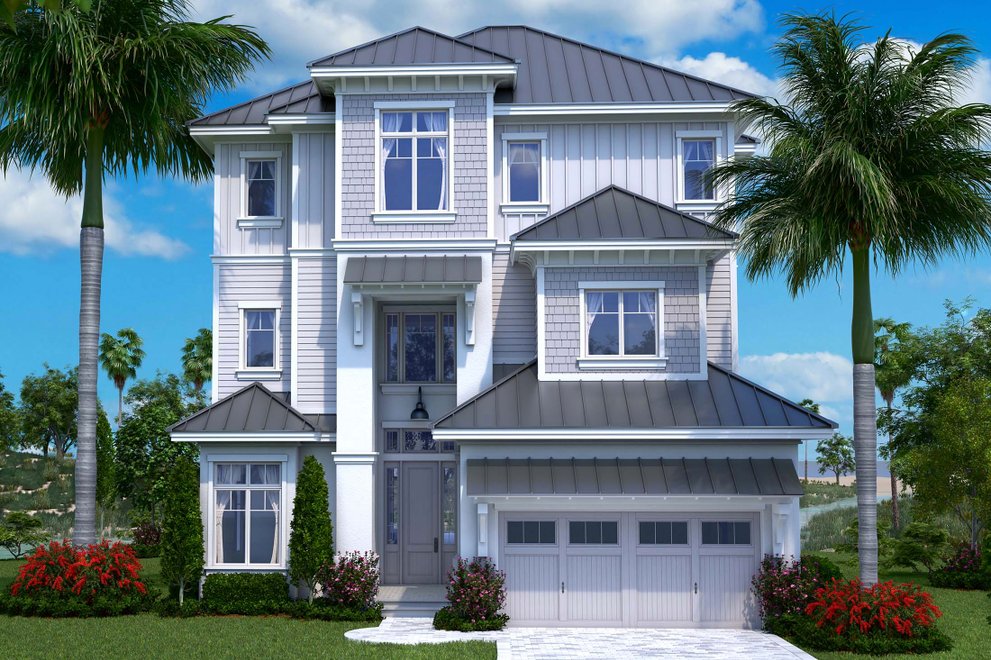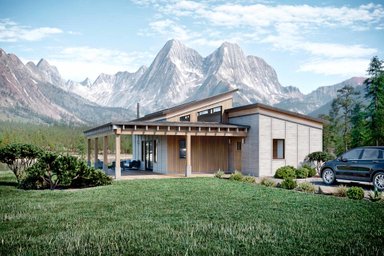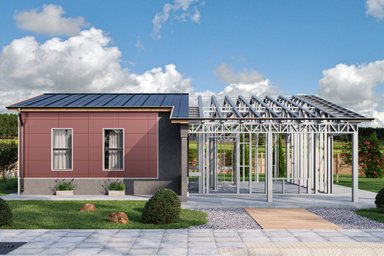Control Costs With Smart
Planning #5: Windows and Siding
In the previous post I discussed how to use smart planning to save money on your roof. After the roof, the last step to getting your house dry and ready for finishes is to install the windows and siding. After that we can insulate, drywall and start installing floors.
Before siding, the windows go in. Generally speaking, vinyl windows are the least expensive, and aluminum clad wood windows are the most expensive. There are quality vinyl windows that offer good value in terms of energy saving. Earlier versions of vinyl windows did not hold up well, and though it is too soon to tell for sure, it seems newer versions will last longer. Nothing compares to a well made wood window though. In my home we have wood windows from 1885 that still work well (with the addition of storm windows to keep out the drafts.) Many people also pay for wood windows for looks. As with most things in a home, you get what you pay for, and you will need to decide what is most important to you. I find that, when asked, people who end up buying wood windows already know that's what they want. If you don't already have an opinion, you'll probably end up with vinyl windows.
As important as the window you select is how well the window is installed. A window that has proper head flashing, is properly taped to the weather barrier, has good sub sill flashing and is foamed and caulked well is critical. It doesn't matter how expensive a poorly installed window is, it will not last, and it can cause thousands of dollars in damage to your house. It will also increase your utility bills. So save money by finding a good builder.
When it comes to siding, there are many options that are affordable, attractive, and low maintenance. Consult with your builder about the types of siding that he is experienced installing and fit the aesthetic of the house, neighborhood and region. Like windows, the installation is as important as the product itself. Water gets behind all siding. Don't think of it as an impenetrable barrier. Siding is like an umbrella, it keeps most of the water away from what's underneath. Since you know water is going to get behind it, the installation should take this into account. If the region where you live gets a lot of rain, the approach will be different than if you get little rain, but in all cases there should be a plan for what happens to the moisture behind the siding. If your house can't dry out, it will get moldy and deteriorate. Things that allow siding to dry include weep screeds, rain screens, Tyvek - but the right combination of materials and technique depend on the situation, so find a builder you trust and if it means paying a little more in installation costs to get siding and a house that will be drier - you will save money in the long run because the siding and the house will last longer.
There are no money saving tricks or secrets here, it all comes down to conscientious building practices. Do your homework when it comes to hiring a builder, because no amount of research you can do will outweigh the years of experience he has. Ask questions and start a dialogue about these crucial details, and you have a house that lasts, because sometimes the best way to save money is to not have to spend it twice.
In the previous post I discussed how to use smart planning to save money on your roof. After the roof, the last step to getting your house dry and ready for finishes is to install the windows and siding. After that we can insulate, drywall and start installing floors.
Before siding, the windows go in. Generally speaking, vinyl windows are the least expensive, and aluminum clad wood windows are the most expensive. There are quality vinyl windows that offer good value in terms of energy saving. Earlier versions of vinyl windows did not hold up well, and though it is too soon to tell for sure, it seems newer versions will last longer. Nothing compares to a well made wood window though. In my home we have wood windows from 1885 that still work well (with the addition of storm windows to keep out the drafts.) Many people also pay for wood windows for looks. As with most things in a home, you get what you pay for, and you will need to decide what is most important to you. I find that, when asked, people who end up buying wood windows already know that's what they want. If you don't already have an opinion, you'll probably end up with vinyl windows.
As important as the window you select is how well the window is installed. A window that has proper head flashing, is properly taped to the weather barrier, has good sub sill flashing and is foamed and caulked well is critical. It doesn't matter how expensive a poorly installed window is, it will not last, and it can cause thousands of dollars in damage to your house. It will also increase your utility bills. So save money by finding a good builder.
When it comes to siding, there are many options that are affordable, attractive, and low maintenance. Consult with your builder about the types of siding that he is experienced installing and fit the aesthetic of the house, neighborhood and region. Like windows, the installation is as important as the product itself. Water gets behind all siding. Don't think of it as an impenetrable barrier. Siding is like an umbrella, it keeps most of the water away from what's underneath. Since you know water is going to get behind it, the installation should take this into account. If the region where you live gets a lot of rain, the approach will be different than if you get little rain, but in all cases there should be a plan for what happens to the moisture behind the siding. If your house can't dry out, it will get moldy and deteriorate. Things that allow siding to dry include weep screeds, rain screens, Tyvek - but the right combination of materials and technique depend on the situation, so find a builder you trust and if it means paying a little more in installation costs to get siding and a house that will be drier - you will save money in the long run because the siding and the house will last longer.
There are no money saving tricks or secrets here, it all comes down to conscientious building practices. Do your homework when it comes to hiring a builder, because no amount of research you can do will outweigh the years of experience he has. Ask questions and start a dialogue about these crucial details, and you have a house that lasts, because sometimes the best way to save money is to not have to spend it twice.






